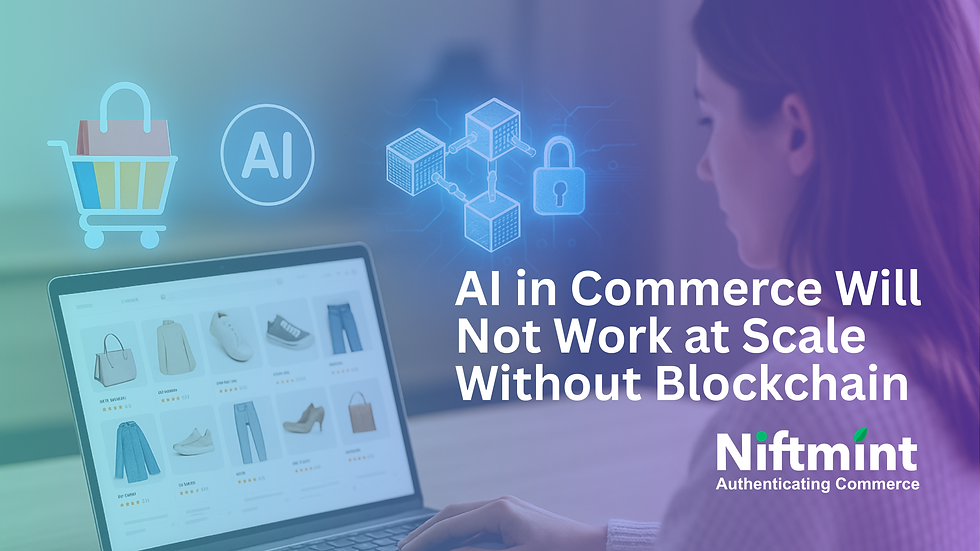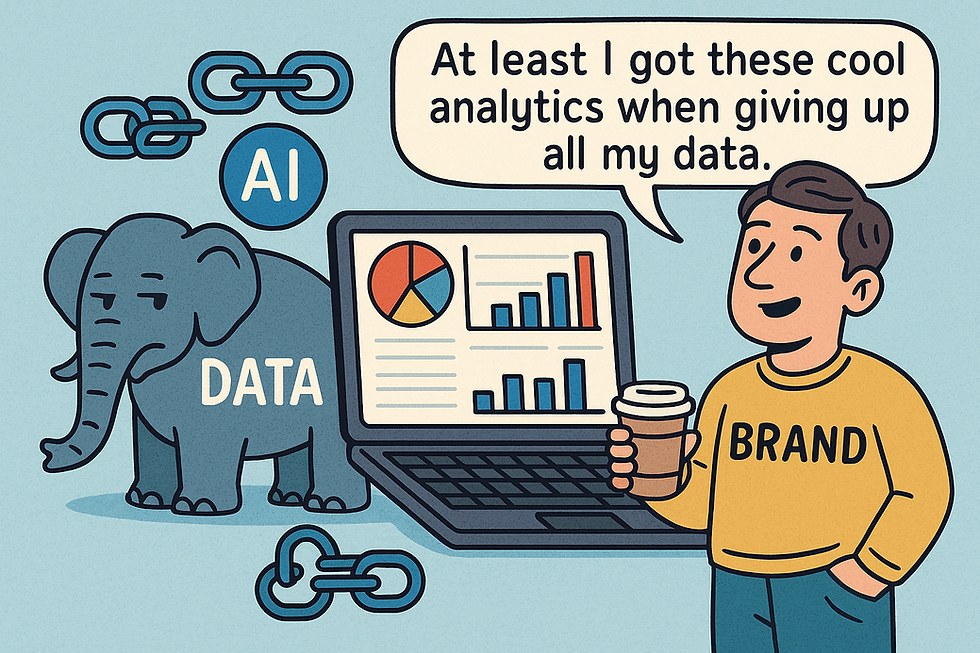AI in Commerce Will Not Work at Scale Without Blockchain
- Jonathan G. Blanco

- Sep 12, 2025
- 3 min read

Everyone in commerce is talking about AI right now. VCs, brands, retailers, and startups are buzzing about personalization engines, supply chain optimization tools, and predictive analytics platforms. And they should be excited. AI has the potential to reshape commerce more than any technology in the last two decades.
But here’s the part nobody’s saying out loud: AI in commerce won’t work at scale without blockchain.
The Hidden Bottleneck: Data and Trust in Commerce
The biggest barrier for AI in commerce isn’t better algorithms or faster GPUs. It’s the quality of the data and the trust that surrounds it.
Most AI today is built on scraped, unpermissioned data. Large models are trained on content pulled from across the internet, blog posts, reviews, images, and even personal information, without the knowledge or consent of the people who created it. For commerce, this is a serious problem:
It’s legally and ethically risky. Retailers can’t build long-term strategies on insights from models trained with questionable data rights. If a recommendation engine suggests products using outputs rooted in unlicensed data, the brand could face compliance and IP issues.
It’s strategically fragile. Scraped data might work for general language tasks, but it doesn’t reflect the signals that actually drive commerce, like purchase histories, warranty activations, product usage, and loyalty engagement.
You can see the cracks already. AI systems recommend irrelevant products because they’ve learned patterns from generic or outdated web text. Review-scraping models amplify fake reviews, treating them as truth. Loyalty platforms inflate points that look like value on paper but collapse when customers try to redeem them.
Meanwhile, brands are stuck “renting” real customer insights from Google, Meta, or Amazon, paying gatekeepers to access their own audiences. And customers themselves, wary after years of breaches and misuse, hesitate to share personal data directly. That starves AI of the permissioned, first-party data it desperately needs.

Even loyalty programs, which should be a goldmine of insight, fall short. Points and digital perks are fragile entries in a brand’s database. They don’t represent verifiable, portable value, and they don’t generate the kind of trusted engagement AI needs to learn and improve.
Blockchain as the Infrastructure for AI in Commerce
This is where blockchain changes the equation. It’s not a buzzword; it’s the missing infrastructure for AI in commerce.
Data Authentication
Blockchain lets customers and brands co-own data. Shoppers can grant or revoke access on their terms, and brands can prove that data is authentic and permissioned. AI trained on this data isn’t guessing; it’s grounded in truth.
Verifiable Value Products, loyalty points, and promotions can live as digital assets on-chain. That makes them portable and persistent. When AI analyzes a customer’s profile, it’s working with assets that actually hold value, not fragile signals that can vanish overnight.
Validated Feedback Loops Product usage, service claims, and interactions can be logged on-chain in real time. That means AI isn’t just processing impressions and clicks — it’s learning from verifiable, tamper-resistant signals. The result is a feedback loop where every cycle makes the model smarter and more accurate.
Direct Relationships Blockchain removes unnecessary middlemen. Instead of relying on third-party platforms to interpret customer intent, brands and shoppers can interact directly. AI in commerce can then operate on authentic, first-party signals that are both trusted and transparent.
AI Is the Engine. Blockchain Is the Chassis.
AI is the engine driving the future of commerce. It’s fast, powerful, and evolving at breakneck speed. But an engine without a chassis doesn’t go anywhere.

Blockchain is that chassis. It provides the trusted, verifiable foundation that allows AI in commerce to scale without breaking down under the weight of bad data, fragile loyalty systems, and eroding customer trust.
Together, AI and blockchain don’t just predict the next purchase. They build a trusted system where every brand unlocks better data, every customer captures real value, and every interaction strengthens the loop between buyer and brand.
The Real Question for Commerce
The question isn’t whether AI will change commerce. It already is.
The real question is: Will AI in commerce be defined by platforms extracting value, or by brands and retailers creating it through trusted, verifiable data?
The answer will determine the future of shopping itself.




Comments